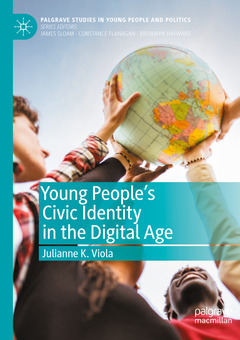Young People's Civic Identity in the Digital Age, 1st ed. 2020 Palgrave Studies in Young People and Politics Series
Auteur : Viola Julianne K.

Julianne K. Viola is a social scientist investigating youth political engagement in a contemporary society characterised by technology use. She has written for The Conversation and has appeared on the BBC World Service. She holds a bachelor’s degree from Cornell University, a master’s degree from Harvard University, and a doctorate from the University of Oxford.
Focuses on experiences of young people living in the US at a unique time in the nation’s democratic history
Highlights the changing nature of youth civic and political engagement
Provides a call to action for parents, educators, and policymakers to reinvigorate civic education for the digital age
Date de parution : 03-2021
Ouvrage de 225 p.
14.8x21 cm
Disponible chez l'éditeur (délai d'approvisionnement : 15 jours).
Prix indicatif 89,66 €
Ajouter au panierDate de parution : 03-2020
Ouvrage de 225 p.
14.8x21 cm
Disponible chez l'éditeur (délai d'approvisionnement : 15 jours).
Prix indicatif 89,66 €
Ajouter au panierThèmes d’Young People's Civic Identity in the Digital Age :
Mots-clés :
meaning of citizenship; experiences of citizenship; youth civic engagement; civic identity framework; political participation; social interaction theory; civic education; civic identity; civic technology; racial identity; US politics; political identity; youth voice and politics; Never Again movement; youth activism; youth political blogs; young people’s civic experiences; citizenship; sociology of citizenship



